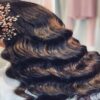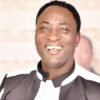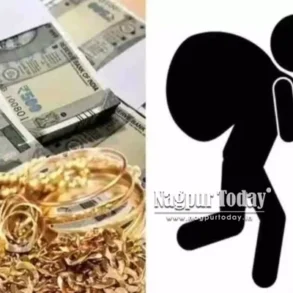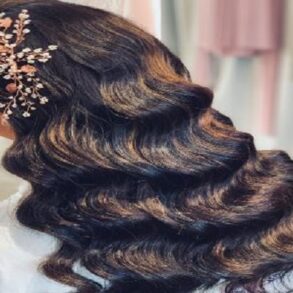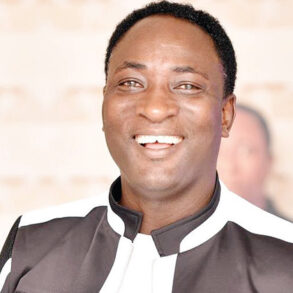One month before the record-breaking release of her album, Cowboy Carter, Beyoncé released her new hair care line for Black women called Cécred (pronounced “sacred”), which has received mostly positive reviews from both critics and customers. In one of her very few interviews, Beyoncé spoke to Brooklyn White-Grier for Essence about Cécred, and about the importance of her hair care at her own hands, and at the hands of her mother, Ms. Tina Knowles.
ESSENCE: What does the name Cécred mean to you? How did you come up with it?
Beyoncé: I have many beautiful memories attached to my hair. The relationship we have with our hair is such a deeply personal journey. From spending my childhood in my mother’s salon to my father applying oil on my scalp to treat my psoriasis— these moments have been sacred to me.
The conversations and debates in the salons and barbershops create a sense of community for the people who look to it as a retreat from their everyday lives. For them, it’s a place to feel beautiful and vent, laugh, share secrets and pass down wisdom. It’s the most consistent community gathering we have. It’s so important that it’s a sanctuary.I think that connection of community, mother and child, father and child, and respect— and allowing yourself to be taken care of, especially for Black women, who are always taking care of everyone else—it’s all sacred. So I took the end of my name, Cé, and made it the beginning of the word sacred to create Cécred. From my mother’s salon, daily rituals with my father, and years of experience in developing a hair care line, the journey has been just that: Cécred.
ESSENCE: This is more than a business to you—it is a part of your birthright. How do you mingle the deeply personal with the professional while prioritizing that it remains sacred?
Beyoncé: My priorities are quality and intention. It was important to decide where we invested in our formulations. I knew what I wanted to do, with technology that works for all women and all textures, because I had not been able to find it. I built this from the ground up and funded it myself. First, I had to find the right team with the best experience who also shared my beliefs. This business was led by heart and passion, not by a business plan. We went above and beyond to make decisions based on results and the absolute best science. And better results meant more investment in quality products. Every hair texture deserves testing, research and development. Black women in general are the last to be included in testing. We are often prescribed things based on studies we were not included in. It’s bigger than me, or hair. Now we have created something that celebrates healthy hair for all women, including us. I’m always honored to invest in us.
Cécred is a legacy project for me, one that’s probably the most rooted in my ancestry. It’s so far beyond business. Hair is our lineage; it’s our family story. Having access to proven ingredients, and creating our own technology that is patent-pending—we now have a line that works universally.
Around the same time as Cécred’s release, Beyoncé donated $500,000 to cosmetology schools and salons through her BeyGood Foundation. Atlanta, Chicago, Houston, Los Angeles, and New Jersey were chosen to offer the scholarships and grants with a total of twenty-five $10,000 scholarships and twenty-five $10,000 business grants intended to be given out.
To read and hear Beyoncé and Ms. Tina discuss the love and attention given to Black women’s hair, and that Black women give to each other when it comes to their hair? It’s not only lovely and amazing, but it’s also a stark reminder of two things: 1) The importance of Black hairstylists and salons where Black women can not only be made to look and feel their absolute best, but where they can talk to, laugh with, and confide in one another without men showing up, demanding attention, and ruining their good time, as they often do both on and off the Internet. 2) How Hollywood has (and continues to) fallen short when it comes to the care and attention given to Black actors and their hair when they’re working on set.
Much like how the stunt community deserves greater respect and acknowledgment of their work, Black hairstylists deserve just as much, if not more, when it comes to their talent and capabilities. For many Black and brown people who regularly watch movies and television shows, it’s impossible to not pay attention to the hairstyles worn by Black and brown performers onscreen. Sometimes, those hairstyles are worth admiring and looking at. Other times… not so much, and they end up becoming a much-deserved laughingstock. One of the clearest and worst examples of the latter: This haircut worn by actor Walter Jones as Zack, the Black Ranger, on Mighty Morphin Power Rangers.
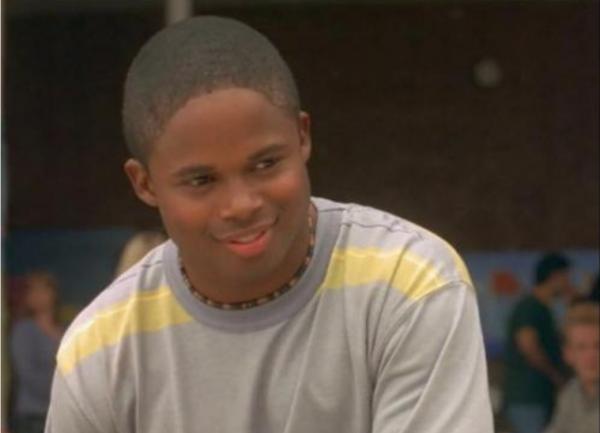
Seriously, look at that sorry-ass excuse for a shape-up. That is the kind of haircut that would get you laughed at in school for two weeks straight, and would possibly get his barber punched in the face.
More recently, there was this wig worn by Corey Hawkins during his stint as Heath on the AMC series The Walking Dead:
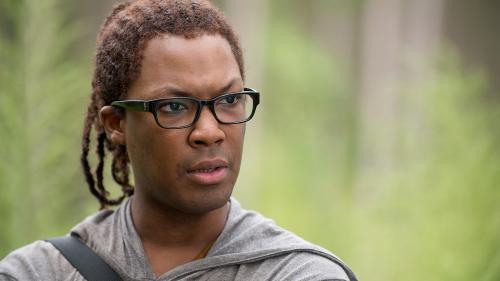
To look at such an atrocious wig having to be worn onscreen only brings to mind the immortal words of one Titus Andromedon from Unbreakable Kimmy Schmidt. And those words are…
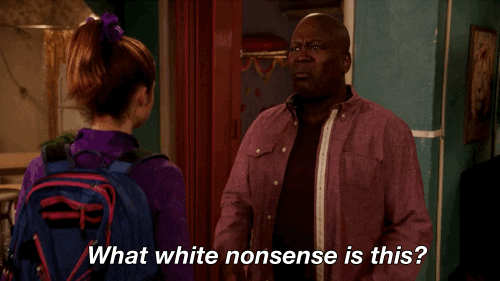
There are numerous horror stories that have been told by Black actors about their negative experiences with hairstylists and makeup artists on set. Candice Patton, who played Iris West on the CW series The Flash, has spoken before about the racism and discrimination she has dealt with from her own network, and from the fandom, and she also discussed the difficulties of receiving proper treatment for her hair whenever she was on set.
Candice Patton: “After a while, I really understood my presence and the value I brought to the show, and I felt less afraid to speak up for myself and shed light on areas that needed a closer look…I spend nine months out of the year shooting 14-hour days and at some point, it became necessary to speak out and use my voice.” She went on to say that she learned firsthand how The CW can be neglectful when it comes to the needs of their talent. Patton said that issues arose when she tried to find a salon in Vancouver, which is where The Flash is filmed, to do her hair. When she wasn’t able to find a salon that suited her needs, she turned to one in Los Angeles when she was in town on break from the show’s shooting schedule.
“I would fly back and forth to L.A. anytime I had a couple of days off,” the actor said. “So I just decided to get my hair treated and done at a local salon I had been to and trusted in Los Angeles. The studio wouldn’t cover the costs for me to do this at my preferred salon.” She added that the production reimbursed her once, but noted that they would not be able to do so again in the future. They encouraged her to find a salon in Vancouver since they would reimburse the costs in that case, but that didn’t account for Patton’s struggles.
“And I’m sure they have logistical reasons for this policy, but the blind spot is not understanding that my options as a Black person are limited in certain places,” she added. “My white counterparts can likely and easily find a salon they feel comfortable going to here, but I can’t. I think there just has to be more in-depth conversations so that productions aren’t limited to these hard and fast rules that could overlook their talent’s needs.” Patton shared some of her hopes for The CW and the entertainment industry in general when it comes to making sets more inclusive for all talent. She said that there needs to be more diversity in front of and behind the camera. The Flash star also shared, “There needs to be a concerted effort towards education. Reforming and reinforcing education that is based on inclusivity is necessary, because Hollywood has not had to think about the on-set experience from the minority perspective.”
Gabrielle Union has spoken about hair discrimination issues on set, particularly when those issues resulted in her being fired from her position as co-host on America’s Got Talent: “Some contestants get the full Hollywood treatment, and then some are left to dangle,” Union says. “When they hit that stage for the opportunity of a lifetime, they want to put their best foot forward and have all of the confidence that everyone else has. When you are making the conscious decisions in hiring, and failing to recognize that you have whole departments that lack the necessary skill set to provide adequate services to all of that diversity that you are touting, you are creating an unequal and discriminatory experience.”
Nicole Byer, tweeted this thread in about what it’s like for her to be Black in America, and the lack of respect and professionalism regarding her hair and makeup is only just part of it: “A hair dresser who didn’t even have a brush or any real tools for my slightly textured wig. So while the other girls get their hair done. I do my own…Having a makeup artist say they are going to contour me but then didn’t even have a color darker than me. So while the other girls got their make up done. I sat in a corner and did my own…A lil chunk of white privilege is people assuming you belong and not having to worrying about if hair and makeup ppl have all the things you need for your skin and hair, because they do. You are the norm.”
Lamorne Morris: “I would have to go to the barbershop at 4, 4:30 am before set to get my hair cut…When I would get to set, I would see everyone else in the hair and makeup trailer getting their hair cut. When I asked why I couldn’t get my hair cut at work, it was because — this is what they told me — they didn’t have the budget for my hair.”
Yahya Abdul-Mateen II: “100% of Black Actor/Actress I’ve spoken to on this topic face the same thing in film and television,” he wrote. “Hair Stylists in our industry should have proper training, AND be able to show proof. Too often they begin to ‘figure it out’ the second we sit in the chair.”
Jurnee Smollett: “In preproduction [for the film Birds of Prey], when we were creating a look for the hair, for me it was very important to bring a woman of color on in the hair department to create the look for Black Canary…My hair, my texture, the kind of blond we were going for — I called her up and said, ‘Honestly, Margot, it’s just different.’…It wasn’t something that they were aware of — the importance of Black women hair and having a woman of color do it…But they were open and they were able to listen, and when I explained it to them, they said, ‘Absolutely, we’ll bring her in.’”
As for the Black and brown hairstylists themselves, and what they have to say about this, and about trying to become members of unions like IATSE Local 706, the Makeup Artists and Hair Stylists Guild?
On one of my first jobs, I was the only person of color on the set. I was having a ball working with over 300 background artists. An actor I had worked with previously spotted me on set. He walked up to me and asked for my help correcting his makeup, because it was far off from his skin tone. I immediately told him that the conversation alone could get me fired. I explained I was there for the background actors only. He understood and walked off. Hours later, I was fired and told “just because you’re black doesn’t mean you get to work with the black star.” I couldn’t tell if my supervisor was trying to convince herself or me. Regardless, I said “okay”, and didn’t attempt to explain. However, before I left, the department head asked me to fix the actor’s makeup. I fixed it, pack my bags and moved on.
A day later, the cinematographer noticed the visual inconsistency in the star’s skin tone from watching the dailies, so I was rehired by production and brought on as a personal to the star. Try to imagine the tension on that trailer when the person who fired me had to see me daily. It was this incident that let me know in order to stay in this business, I would have to dance to a beat that was constantly changing. The micro aggressions, the toxic work environments, and the unspoken “you’re not supposed to be here” attitude.
Nakia Collins: “I’ve had clients fight to have me on their sets and get shut down because I’m not a union stylist…I’ve also been brought on to sets that are unionized and have been told to sit in the trailer since I physically couldn’t be on set.”
Denise Tunnell: “I’ve heard these stories throughout my career. Actresses would tell me about how they would have to go back to their trailers and change their makeup or do something a little bit different to their hair,” she says. “I’ve heard of a really popular actress who, when she came to Atlanta to shoot a show, a white department head, sent her to [a makeup counter at] the mall for them to match her skin tone.”
The lack of respect and equality given to Black actors (and Black writers, producers, directors, executives, hairstylists, makeup artists) is why, after the summer of 2020, most Black people didn’t believe or take seriously the pie crust promises that were made by movie and television studios, and other corporations made about how much they were listening and learning, and taking serious steps to try and end corporate racism by creating and supporting opportunities for diversity in front of and behind the camera, and in the boardrooms as well. Since then? Movies and television shows with diverse casts and crews have received little to no support from their studios, and are left to either fail at the box office, deal with little to no viewership, having large and supportive viewer numbers ignored in favor of the algorithm, shelved entirely to never to be seen by anyone, or be canceled, much to the anger and disappointment of viewers. And this was before the shutdowns and cancellations of school curriculums and entire academic departments due to Critical Race Theory and Diversity, Equity, and Inclusion (DEI), which has given many racist f-ckboys and Pick-Mes another way to express their hatred of Black and brown people, and of their accomplishments.
From this Refinery29 article published in 2019:
“There are Black people in the union, but I think there’s a disconnect because some of them might not know the right people to connect them on certain jobs,” stylist Camille Friend says. “This year alone, I helped staff three films that I was not department head on simply by connecting producers with people qualified to do the job well.”
Friend acknowledges that a huge part of booking jobs is who you know, but she stresses that having the right skills is equally important. While there’s no denying that Black people are typically more familiar with styling Black hair, stylists of all races and ethnic backgrounds should know how to work with any texture that ends up in their chair. “As an African-American stylist, I’ve been trained to work on all hair types,” says Takisha Sturdivant-Drew. Friend agrees that it ultimately boils down to education. “If stylists — union or not — were more committed to continuous education and practice on all skin tones and hair textures, some of these issues could be eradicated.”
There are many things that Hollywood can and should do so that Black and brown artists of all kinds can be hired and permitted to do fulfilling work that also pays generously so that they aren’t left weeping when talking about the work conditions during the press tour for their newest project. Black actors already have enough to worry about and deal with when it comes to getting a foot in the door to find work and get roles. But if they also can’t look or feel their very best on set before the cameras start rolling, their performances can possibly suffer as a result, which could also lead to even more difficulties for them finding additional work on other projects. And Hollywood allowing Black actors to have trusted, talented individuals on set who understand what’s truly needed from them, is a very good start.
This post was originally published on this site be sure to check out more of their content.


